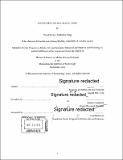Countering source bias in news
Author(s)
Anderton-Yang, David Wesley.
Download1145278624-MIT.pdf (5.615Mb)
Other Contributors
Program in Media Arts and Sciences (Massachusetts Institute of Technology)
Advisor
Andrew Lippman.
Terms of use
Metadata
Show full item recordAbstract
Facts don't speak for themselves. What we accept as fact and the truth we derive from it are strongly dependent on both our opinion of the source and the agent of recommendation; how we encountered the information. In an increasingly nationalized and fragmented society, the representation and presentation of news functions less to build a shared set of values and beliefs and more to drive a wedge between groups that precludes discussion. These trends are well-known and long-lived, but are critically important now because the Internet has intensified them by multiplying niche sources and amplifying the role of recommendation. The central question of this thesis is what we can do about it - whether we can create media presentations and interactions that encourage us to explore the diversity that the Internet brings, and whether there is a "teachable" moment in doing so. For example, will we temper deeply held opinions when we explore sources we don't normally attend? I present an attempt to do this that first allows users to establish a set of sources ranked by personal trust and then second, allows them to blindly compose their own news stories from the suite of them. I consider two outcomes: whether they soften otherwise hardened opinions after they note their own acceptance of what the "other side" says, and whether this approach might scale through passing these new compositions onwards to propagate the idea. I find that there is a clear disconnect between participants trust in news sources and the sources they utilize to create an objective story. This disconnect is much more severely noted in those participants who self-identified as left-leaning politically.
Description
Thesis: S.M., Massachusetts Institute of Technology, School of Architecture and Planning, Program in Media Arts and Sciences, 2019 Cataloged from PDF version of thesis. Includes bibliographical references (pages 60-64).
Date issued
2019Department
Program in Media Arts and Sciences (Massachusetts Institute of Technology)Publisher
Massachusetts Institute of Technology
Keywords
Program in Media Arts and Sciences